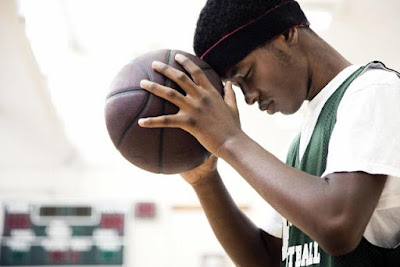A college tennis player who is one of the top seeded players on his team was struggling with his serve - with a higher-than-average number of double faults. At a match, I could see from his serves that he was tight and not getting good extension, and how frustrated he was becoming.
After the match I spoke with him and asked him what was going on. For one thing, he told me that in doubles play he didn't want to let his partner down (though of course, this let him to put on himself exactly the kind of pressure that led to his double faults!) In addition, he told me that he was trying to make fewer mistakes - which meant he was playing more with a mindset NOT to lose and less-so the aggressive thinking of a player looking to go out and win.
Since he and his team were playing against another school that afternoon I wanted to find something QUICK and SIMPLE that I could give him to make some immediate correction to this problem.
So I singled out the matter of his tenseness, and got him to see where he was tight: in his shoulders, in his forearm and in his grip of the racket. I asked him what his body sensation is like when he has served at his best and he said it was more relaxed and fluid.
I suggested to him that he make a point of focusing on those sensations and that he get himself properly relaxed before each serve ... and by focusing only on that he might let the results (whether the serve was in or not) take care of themselves. Being an experienced player, I knew that if he was relaxed, and able to clear his mind of all these worries, that what we call "muscle memory" would kick in and his best serves would come of themselves.
Sure enough, in the second match of the day he was more relaxed, and while he did have a number of double faults and dropped service one one occasion, he did a far better job and won his match.
Playing again the next day, he started off quite well, taking the first set 6-3. But then he started to have some difficulties, and lost the second set 1-6. But - and here is the key thing that he did to turn things around - he paused before the third set and said to himself, "What was I doing that brought me success in the first set? That is what I have to get back to." That led him to returning to a more aggressive game ... not worrying about making mistakes or double faulting but having fun and simply bringing his best efforts to bear.
"I decided that I had NOTHING TO LOSE and that's the attitude I played with."
In the third set both players held serve. His opponent was up 6 games to 5 and had double match point at 15-40 ... but sticking with what he told himself between sets helped him to play his best at crunch time, winning the game and forcing a tie-break .. which he won 7-3 and giving him the match.
* * *
A basketball player with whom I have been working had a similar experience in a recent game. He missed a number of shots in the opening minutes and started to feel stressed.
"I missed a lot of easy shots in the first half. My coach was yelling at me and my head was going crazy. But at half time,
I listened to my body - it was tight. I took some deep breaths and relaxed, trying to let everything go. I then went out and finished two shots around the rim and hit a "3" early in the third quarter. Then I started to feel that I was "in the zone." I hit five-of-eight from 3-point range. I ended up with 25 points and 10 rebounds. Being able to turn things around like that was an amazing experience!"* * *
A swimmer I worked with was worrying about his times as he prepared for the end-of-season conference tournament,especially because if he failed to do well in qualifying heats he would not advance on to the finals in his event, the 200 yard free style. He knew from previous experience that when he worries about the results his body tightens up, which makes his stroke less efficient, working against him just as the above-mentioned tennis player's worryies about letting his doubles partner down worked against him.
We discussed how it could be better for him to shift his forcus to thinking about his technique - about finishing his stroke fast and strong - and letting the results take care of themselves. Following disappointing finishes in previous years, his senior year at the conference meet was his last chance. Calling upon this strategy, he ended up setting a school record for this event!
* * *
These are all good examples of how when an athlete lets go of his concerns for the results and focuses on how he is playing, he usually ends up performing at a higher level and getting the wished-for results.
(c) 2015 by Dr. Mitch Smith





